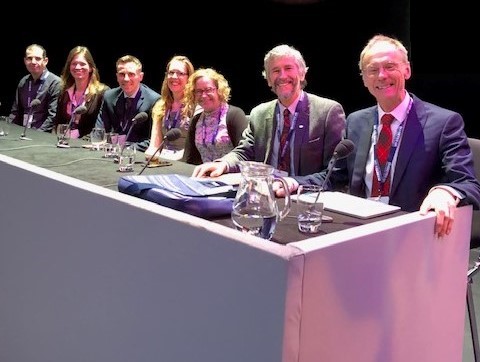2024 Rank Prize for Nutrition awarded to the DiRECT leaders
The Rank Prize for Nutrition, usually awarded every two years, is reckoned the world’s most prestigious prize for research in nutritional sciences. The 2024 prize was awarded to the leaders of the DiRECT trial, Professors Mike Lean and Roy Taylor, at a ceremony in the Royal College of Physicians of London, on July 1st 2024.
The award was made for their independent research paths, investigating the reasons for type 2 diabetes developing and the possibility of reversing the process, which came together with the DiRECT Trial.
https://www.rankprize.org/prize/nutrition/winners/2024/
https://www.rankprize.org/news-events/rank-prizes-2024-awarded-in-london/
More information about this award can be found on our news page.
DiRECT 2024 Update
The much anticipated 5-year results, from the 2-year DiRECT trial and its 3-year DiRECT Extension Study, were published in The Lancet Diabetes & Endocrinology, on 23rd February 2024. (See Publications page)
In nutshell, NHS data on all the original DiRECT participants were collected for a total of 5 years, to see how well the remarkable one and two year results from a dietary weight management programme (remission of diabetes for 46% at 1 year, 36% at 2 years) would be maintained, and whether longer durations of weight loss, of freedom from diabetes medications and of remissions from type 2 diabetes might be associated with better clinical outcomes.
The original DiRECT Intervention group were offered and accepted low intensity dietary support from their practice nurse or a dietitian if one was available. However, follow up to 5 years was no longer a randomised trial: the original Control group participants were all provided with the one and two-year results, showing high rates of remission, and given advice to lose as much weight as they could. Many of them did exactly that, and some did achieve remissions through weight loss either on their own or with local help.
There was considerable weight regain in the first 3 years after starting the diet intervention, but the original DiRECT Intervention group still had an average weight loss of over 6kg (almost 1 stone) after 5 years, and about a quarter of those who had achieved remission of diabetes ate 2 years remained in remission at 5 years.
The diet intervention programme designed for in DiRECT was not perfect, or the last word, but it generated much better results with better sustained weight losses, than previous diets, and there were no unexpected hazards. Indeed, it appears safer to have the intervention than not to: there were half as many serious medical problems requiring hospital admission in the Intervention group over 5 years, compared to those who did not have the DiRECT intervention.
Excitingly, the 5-year results provided new support for making evidence-based weight management, to seek remission, an important early target for medical management of type 2 diabetes. In line with other studies of remission, the results suggested that maintaining substantial weight loss for longer, and maintaining lower HbA1c, off anti-diabetes medication and longer emissions, were all associated with suffering fewer clinical illnesses caused by diabetes.
The message for people diagnosed with type 2 diabetes is good. Based on all the results from DiRECT and other studies, we are now very confident that achieving and maintaining substantial weight loss (over 10 or 15 kg if possible) is the best start to control a very unpleasant progressive disease. Weight loss helps at any stage but remission of type 2 diabetes is most likely with weight loss soon after diagnosis. And other research has taught us that people with type 2 diabetes who are not overweight may still have abnormal body fat accumulations in vital organs, which can be removed to generate remission by relatively modest weight loss.
We all know that under the influence of modern foods and persuasive marketing it is very hard to overcome appetites and sustain substantial weight losses. The message for healthcare professionals from DiRECT is that many people can succeed, with consistent sensible advice and encouragement, and professional diet support programmes like the one used in DiRECT are now available. A bonus from the DiRECT intervention was that ‘quality of life’, or wellbeing, was significantly improved at every year up to 5 years in the participants who received the intervention within their routine primary care management of diabetes, including those who were less successful. Researchers must now seek even better diet programmes, particularly to help people maintain weight loss longer, but the DiRECT intervention is a good start.
DiRECT 2023 Update
The main task for 2023 has been to complete analyses on the DiRECT Extension Study, after all data collection finished in 2022.
For the DiRECT Extension study low-intensity support was provided to try to help maintain weight loss and remission for all the remaining DiRECT Intervention group participants, for 3 more years after the 2-year randomised trial ended. The preliminary 5-year results were presented at the annual UK Association of Physicians meeting, and also at the Diabetes UK Professional Meeting, both in Liverpool. A full paper has been written and submitted for publication.
Several secondary analyses from the original 2-year DiRECT trial have also been completed, and the DiRECT data have been shared with other research groups in collaborations to examine how genetic markers of coronary heart disease risk predict clinical events, and how metabolomic markers (small peptides, and parts of proteins which are associated with diabetes and cardiovascular disease) in the bloodstream improve with the DiRECT intervention. Links to the publications are in the Publications section of this website.
The impacts of the DiRECT trial continues to grow, both within Britain and internationally. New clinical guidelines in several countries, and from the European Association for the Study of Diabetes, now recommend weight loss and remission as a primary management target for people with type 2 diabetes. In both Scotland and England, the National Health Services have established strategies to divert resources and provide effective weight management in national-level Diabetes Remission programmes. People living with type 2 diabetes across the world are asking for treatment and support to achieve remission, and large numbers have been successful. Importantly, the STANDby trial, using the same Counterweight intervention as DiRECT, showed that people of South Asian ancestry, who have very high rates of type 2 diabetes at lower BMI and younger ages, can achieve remission, with loss of ectopic liver fat, just like people of European heritage.
https://doi.org/10.1016/j.lansea.2022.100111
Further afield, Type 2 Diabetes Remission projects based on DiRECT have been conducted in many other countries, notably including Australia and New Zealand. Pilot food-based intervention projects based on DiRECT are also running in Lower and Middle Income Countries such as Nepal, where the personal risks and community burdens from Type 2 Diabetes are much greater, but modern drug treatments are unavailable or unaffordable.
DiRECT 2021 Update
In 2020 and 2021, we are continuing to collect data from participants in DiRECT, into their 4th and 5th years of support and follow-up. Covid 19 has made both weight-loss maintenance and data collection difficult, but the Glasgow and Newcastle University research teams have continued to analyse the 2-year results. Important new papers from DiRECT have been published, on the predictors of success for weight loss and remission, the cost-effectiveness of the treatment (it saves healthcare money!) and on the detailed mechanisms behind repairing the pancreas and restoring insulin production.
Now that providing the DiRECT intervention has been shown to save NHS costs, it is now becoming widely available in UK. All Scottish Health Boards received the training to provide the DiRECT/Counterweight-Plus intervention for remission of type 2 diabetes in NHS Scotland by December 2019. In September 2020, a programme was launched to introduce the intervention for 5000 people with type 2 diabetes in selected areas of England.
Published results
On the 6th March 2019 the 2nd year results of the Diabetes Remission Clinical Trial (DiRECT) were presented at the DUK Professional Conference
A PDF document containing the presentation slides can now be found on the Study Information page.
The results have been published at The Lancet - Diabetes & Endocrinology website and these results have also been reported in prominent UK media organisations including The Times and the Daily Mail
* A press release for this can opened by clicking this link
More information about the study can be found on our News and Publications pages

On the 5th December 2017 the 12 month primary outcome results of the Diabetes Remission Clinical Trial (DiRECT) were presented at the International Diabetes Federation Congress hosted in Abu Dhabi. Talks were delivered by both Professor Roy Taylor and Professor Mike Lean, with both pictured here with Professor Naveed Sattar enjoying some refreshments following the event.
A PDF document containing the presentation slides can now be found on the Study Information page.
Information and resources for weight loss and remission of type 2 diabetes are listed further down this page.
More information about the study can be found on our News and Publications pages
